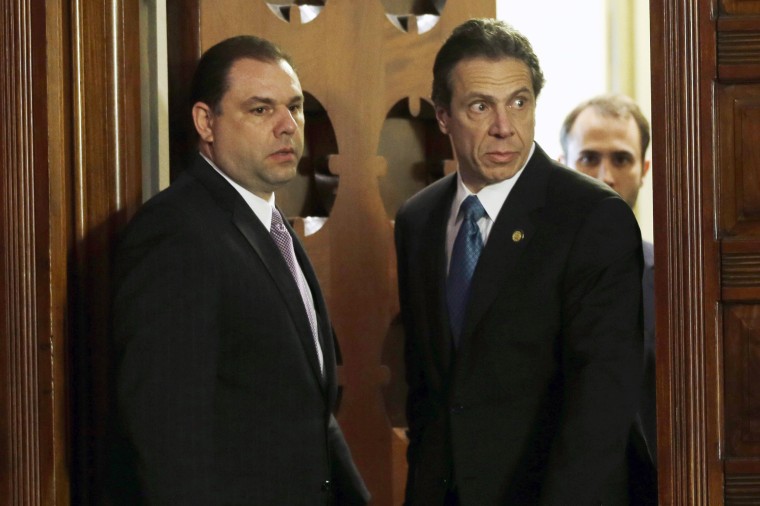WASHINGTON — The Supreme Court on Monday questioned whether an ex-aide to former New York Gov. Andrew Cuomo was lawfully convicted on a bribery charge as it considered two cases that could place new limits on federal prosecutors in public corruption cases.
The first case centered on whether Joseph Percoco’s conduct in taking a $35,000 payment from a real estate developer when managing Cuomo’s re-election campaign in 2014 is covered by a federal law that requires that “honest services” be provided to the public. Percoco says that because he was not working for the government at the time, he had no duty to provide honest services.
The second case involves Louis Ciminelli, a real estate developer based in Buffalo, who was convicted of wire fraud for seeking to rig the bidding process for redevelopment contracts in the city. His lawyers argue that his conduct in ensuring that his company would be a preferred bidder, which involved trying to influence the selection criteria set by the state to benefit his company, did not rise to the level of fraud.
Justices seemed sympathetic to the defendants during both oral arguments. In Percoco's case, a majority of the nine justices appeared concerned that allowing nongovernment employees to be criminally charged would draw in other influential figures in the halls of power, such as lobbyists. Conservative Justice Neil Gorsuch remarked that Washington is "full of such persons."
Liberal Justice Ketanji Brown Jackson likewise pressed government lawyer Nicole Reaves on the question of how to draw the line between unlawful and lawful influence over government.
"How do you distinguish that person from a lobbyist?" she asked.
On the other hand, liberal Justice Elena Kagan also seemed concerned that adopting Percoco's argument would allow government officials to game the system by resigning from office and then take payments that would otherwise be viewed as bribes before then resuming their government functions.
Prosecutors say that Percoco was only temporarily working for Cuomo’s campaign when he took the payment from developer Steven Aiello, who was seeking state funds for a construction project. Percoco worked as a senior aide to Cuomo from 2011 to 2016 except for eight months when he ran the campaign.
Percoco was convicted in 2018 on one count of honest services fraud for the real estate payment. At the same trial, he was also convicted of another count of honest services fraud and one count of soliciting a bribe for arranging for Competitive Power Venture, an energy company with business before the state, to make payments to his wife.
He was sentenced to six years in prison for all three offenses.
The New York-based 2nd U.S. Circuit Court of Appeals upheld the convictions in a September 2021 ruling.
Percoco’s lawyers argue that because prosecutors sought to tie the two schemes together in the trial, their client should receive a new trial on the second set of charges if Percoco prevails at the Supreme Court on his honest services claim.
The justices seemed to be sympathetic to Ciminelli’s arguments, too, expressing concern about the Justice Department’s reliance on what some indicated might be an overly broad interpretation of the fraud law.
Conservative Justice Brett Kavanaugh seemed particularly concerned that the government had seemed to somewhat agree with Ciminelli's lawyers that the appeals court's broad interpretation of the law on whether his conduct in the bidding process constituted fraud was incorrect, despite relying on the same theory in other prosecutions over several decades.
"You just said it's easier to convict people under this incorrect articulation of the theory than under the correct articulation of the law," he told government lawyer Eric Feigin. "I think you just said that. And that's very problematic."
Several others targeted in the New York investigation, including Aiello, have their own appeals pending at the Supreme Court.
Cuomo, who resigned in 2021 after facing sexual harassment claims, was not charged.
The Supreme Court in recent years has already limited the scope of bribery laws, most notably in a 2010 ruling in favor of Jeff Skilling, the former CEO of Enron Corp. More recently, the court in 2016 threw out the corruption convictions of Republican former Virginia Gov. Robert McDonnell.

